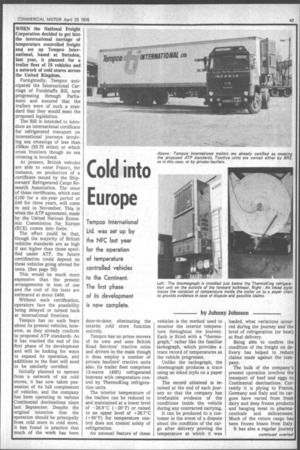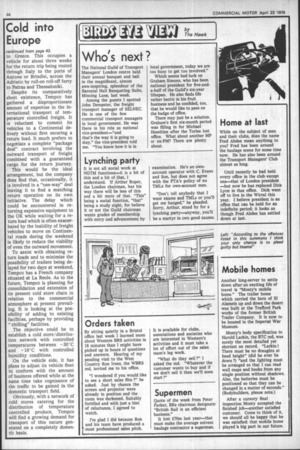Cold into Europe
Page 45

Page 46

If you've noticed an error in this article please click here to report it so we can fix it.
Tempco International Ltd. was set up by the NFC last year for the operation of temperature controlled vehicles to the Continent. The first phase of its development is now complete. by Johnny Johnson
WHEN the National Freight Corporation decided to get into the international carriage of temperature controlled freight and set up Tempco International, based at Swindon, last year, it planned for a trailer fleet of 15 vehicles and a network of cold stores across the United Kingdom.
Farsightedly, Tempco anticipated the International Carriage of Foodstuffs Bill, now progressing through Parliament and ensured that the trailers were of such a standard that they would meet the proposed legislation.
The Bill is intended to introduce an international certificate for refrigerated transport on international journeys involving sea crossings of less than 150km (93.75 miles) or which cross frontiers though no sea crossing is involved.
At present, British vehicles are able to enter France,. for instance, on production of a certificate issued by the Shipowners' Refrigerated Cargo Research Association. The issue of these certificates, which cost £100 for a six-year period or £40 for three years, will come to end in November. This is when the ATP agreement, made by the United Nations Economic Commission for Europe (ECE) comes into force.
The effect could be that, though the majority of British vehicles standards are as high if not higher than those specified under ATP, the future certification could depend on these vehicles going abroad for tests. (See page 50) This would be much more expensive than the present arrangements in loss of use and the cost of the tests are estimated at about £400.
Without such certification, operators face the possibility being delayed or turned back at international frontiers.
Tempco has no such fears about its present vehicles, however, as they already conform to proposed ATP standards. As it has reached the end of the first phase of its development and will be looking for ways to expand its operation, and additions to the fleet will need to be similarly certified.
Initially planned to operate from a network of six cold stores, it has now taken possession of its full complement of vehicles, and the company has been operating to various Continental destinations since last September. Despite the original intention that the operation should be principally from cold store to cold store, it has found in practice that much of the work has been door-to-door, eliminating the interim cold store function entirely.
Tempco has no prime movers of its own and uses British Road Services' tractive units and drivers in the main though it does employ a number of private hauliers' tractive units also. Its trailer fleet comprises 12-metre (40ft) refrigerated boxvans with temperature control by ThermoKing refrigeration units.
The interior temperature of the trailers can be reduced to and maintained at a lower level of —28.9°C ( —20°F) or raised to an upper level of +26.7°C (+80°F) for temperature control does not consist solely of refrigeration.
An unusual feature of these vehicles is the method used to monitor the interior temperature throughout the journey. Each is fitted with a "thermograph," rather like the familiar tachograph, which provides a trace record of temperatures as the vehicle progresses.
Unlike the tachograph, the thermograph produces a trace using an inked stylo on a paper chart.
The record obtained is retained at the end of each journey so that the company has irrefutable evidence of the conditions inside the vehicle during any contracted carrying.
It can be produced to a customer in the event of a dispute about the condition of the cargo after delivery proving the temperature at which it was loaded, what variations occurred during the journey and the level of refrigeration (or heat) at final delivery.
Being able to confirm the condition of the freight on delivery has helped to reduce claims made against the company.
The bulk of the company's present operation involves the transport of beef and eggs to Continental destinations. Currently it is plying to France, Germany and Italy and its cargoes have varied from fresh dairy and deep frozen products and hanging meat to pharma ceuticals and delicatessen. Much of the return cargo has been frozen beans from Italy. It has also a regular journey to Greece. This occupies a vehicle for about three weeks for the return trip being routed through Italy to the ports of Ancona or Brindisi, across the Adriatic by roll-on roll-off ferry to Patras and Thessaloniki.
Despite its comparatively short existence, Tempco has gathered a disproportionate amount of expertise in the international transport of tem perature controlled freight. It is reluctant to commit its vehicles to a Continental de livery without first securing a return load. It much prefers to negdtiate a complete "package deal" contract involving the outward transport of freight combined with a guaranteed cargo for the return journey.
This would be the ideal arrangement, but the company does 'find that, occasionally, it is involved in a "one-way" deal leaving it to find a matching return operation on its own initiative. The delay which could be encountered in returning expensive equipment to the UK while waiting for a return load which is often exacerbated by the inability of freight vehicles to move on Continental roads during the weekend is likely to reduce the viability of even the outward movement.
To assist with obtaining return loads and to minimise the possibility of trailers being delayed for two days at weekend, Tempco has a French company situated at La Reole. As to the future, Tempco is planning for consolidation and extension of its present cold store chain in relation to the commercial atmosphere at present prevailing. ft is looking at the possibility of adding to existing facilities, perhaps by providing " chilling" facilities.
The objective could be to establish a cold store/distribution network with controlled temperatures between —30°C and -1-10°C with controlled humidity conditions.
On the vehicle side, it has plans to adjust its vehicle fleet to conform with the amount of business offered while at the same time take cognisance of the traffic to be gained in the domestic transport field.
Obviously, with a network of cold stores catering for the distribution of temperature controlled produce, Tempco will find a growing demand for transport of this nature generated on a completely domestic basis.
































































































